Above: The community kitchen and event space is the newest element of Fruit Valley Village. It opened in October 2022 and in its first event raised over $20,000 for the local Boys & Girls Club.
I plan to spend much of the next year traveling to c-stores across the country thanking them for all they’re doing.”
Don Rhoads, the newly named NACS chairman, learned all about giving back by observing his dad.
As a middle school teacher and counselor, his dad, Don Sr., knew exactly which students were struggling. His father often invited several of them to stay at the Rhoads’ modest household in Kelso, Washington, over the weekend and would arrange for the group to play sandlot football games. Perhaps the best thing about those ballgames was the bike trip to the neighborhood store right afterward, where the gang would load up on penny candies—often quietly paid for by his dad and the store owner.
“That was my first real experience at the neighborhood store,” says Rhoads, who besides his new NACS gig is also president and CEO of The Convenience Group, which is based in Vancouver, Washington, and owns and operates eight c-stores in Washington. “I’m trying to emulate that today—with the neighborhood store as a safe and caring place.”
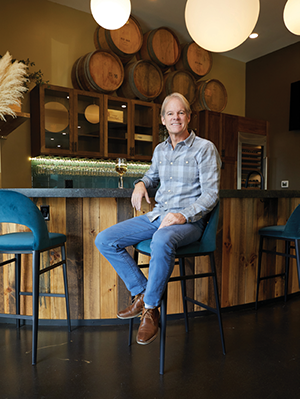 Don Rhoads in his Fruit Valley Village location shares his vision for the complex. The site has a traditional Minit Mart convenience store and fueling, plus community-focused initiatives like a food bank, credit union focused on lower-income customers, a small business resource center and a community kitchen and event space, which is made available to local charities for their fundraising events.
Don Rhoads in his Fruit Valley Village location shares his vision for the complex. The site has a traditional Minit Mart convenience store and fueling, plus community-focused initiatives like a food bank, credit union focused on lower-income customers, a small business resource center and a community kitchen and event space, which is made available to local charities for their fundraising events.
During his next year as NACS chairman, more than anything else, Rhoads hopes this message of the c-store industry giving back to the community, to its customers and to its workers is the message that lives on as not just his own legacy, but as the entire c-store industry’s legacy.
“We as individual companies do not articulate how much we give back to our communities,” said Rhoads. In charitable giving alone, the c-store industry contributed more than $1 billion over the past year, he says. But it’s the giving that can’t necessarily be monetized—the implicit giving that’s not in cash but in time, free products or good deeds—that might be the c-store industry’s real hallmark. This has been particularly true over the past several years as the COVID crisis has ebbed and flowed and tested the industry like few challenges before it.
“I plan to spend much of the next year traveling to c-stores across the country thanking them for all they’re doing,” Rhoads said.
Indeed, there’s plenty to be thankful for. The nation’s 148,000 c-stores continue to quietly help their neighborhoods and communities— nevermind that 60% of these c-stores are not big chains but are independent, single-store operators, Rhoads points out. But they’ve plowed forward right through COVID.
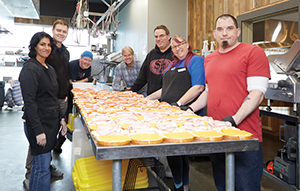 Fruit Valley has a commissary kitchen that supplies prepared food daily to The Convenience Group’s stores–or for special events.
Fruit Valley has a commissary kitchen that supplies prepared food daily to The Convenience Group’s stores–or for special events.
So, too, has NACS as an organization. “Folks need to know it hasn’t been easy,” said Rhoads. “NACS has had to pivot and reinvent itself over the past few years for a number of reasons. NACS has made it much easier for members to navigate through this difficult time.” Among the key things NACS has been doing—and will continue to do for members over the next year, he says, is to provide “guardrails” through advocacy, retail engagement and outreach on legislative issues. Among his NACS goals for 2023:
- Thank NACS members nationally. While it’s the board of directors—not the chair—that will set the NACS 2023 agenda, he says, “I do set the tone as chair.” So, he plans a series of road trips nationwide to personally thank c-store owner-operators big and small.
- Embrace front-line workers. “It’s critical that we tell them how much we appreciate the journey they’ve been on the past few years,” said Rhoads. Most critical for c-store owners, he says, is to provide a welcoming setting for workers, who, after they leave their homes in the morning, should feel like they are arriving at their second home when they get to work.
- Settle the credit card swipe-fee issue. Swipe fees from the big credit card companies have a $14 billion annual impact on the c-store industry. He vows to continue focusing on this and pushing for a resolution.
- Advance technology and share best practices. Rhoads recently returned from a NACS Innovation Leadership Program at MIT. “I learned so much listening to the young change agents in the room. They are transforming what this looks like,” he said.
- Outreach to smaller operators. His own chain has just eight stores—each one uniquely designed and uniquely stocked to meet the needs of its neighborhood. For a majority of NACS members who are single-store operators, he asks, “How do we better engage and come up with a process to move them into the NACS family?”
- Deal with labor challenges. Create a culture where people want to work there and respect them by offering good pay and benefits. The minimum wage in Washington state is about to hit $16 per hour—and he says he already pays better than that at his stores. “You have to develop a workplace culture where your people don’t want to be looking for employment elsewhere,” he said. It also helps that his employees all know he has a 24/7 open-door policy.
You have to develop a workplace culture where your people don’t want to be looking for employment elsewhere.”
GET INSPIRED
Figuring out how to divide his time over the next year to help accomplish all of these goals—yet still oversee The Convenience Group—will not be simple. Rhoads says that he will meet NACS members on his “thank you” tour. He also will attend some domestic NACS leadership conferences, plus NACS Convenience Summit Europe in Dublin, Ireland, May 30 to June 1. Then, there’s the NACS Show in Atlanta in October. “If you do one thing, go to the NACS Show,” he said. “For the convenience industry it’s where to get inspired and rewarded. It’s like going to Disneyland.”
When he’s on the road, he’ll typically stop into a local c-store for a cup of coffee or perhaps an energy drink. But once he’s in the store, he said, “I’m like a sponge.” He soaks in everything from the store design to the merchandising to the equipment to the employee uniforms. “If I can sneak behind the curtain and see what’s in the back, I’ll do that, too,” he said.
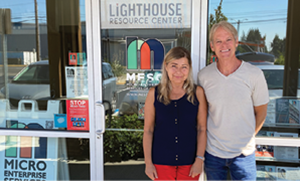 The Lighthouse Resource Center has helped more than 80 local businesses with free development services.
The Lighthouse Resource Center has helped more than 80 local businesses with free development services.
Rhoads has been involved in one way or another with NACS for 30 years. “It was a springboard for me to learn so much about this industry,” he said. About three decades ago he was first hired into the c-store industry to retire the debt on a 60-store chain in the Pacific Northwest. “I couldn’t imagine navigating this road map without names,” he said. That’s when he first turned to NACS for help.
During the challenges of the COVID-19 pandemic, Rhoads says he participated in more than 60 phone calls between different state associations and NACS leadership in an attempt to share best practices. He credits NACS leadership over the past several years for helping NAC members navigate extremely difficult times.
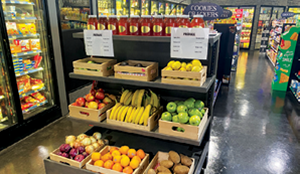 Minit Mart provides both immediate consumption foods and an extensive produce selection as part of its fill-in grocery offer.
Minit Mart provides both immediate consumption foods and an extensive produce selection as part of its fill-in grocery offer.
He tries to recreate this same open-door policy at his own company. Each of his individual stores has (paid) monthly phone meetings for the entire staff. The meetings focus on two key questions: 1) What’s working? 2) What’s not working? What’s not working is what he wants to know most of all. Sometimes it’s equipment that needs repair. Other times it’s shift or labor issues. He’s learned to move employees around to different stores and different posts “to give them a different perspective on store operations.”
Most recently, he’s begun hiring back older employees—as part-timers—who had retired from the industry. He currently has three such seasoned, part-time workers—two of whom are category managers in wine and beer. “The wealth of knowledge they bring is a huge benefit to us,” he said.
We all have been through that place in our lives where having a helping hand is a big deal.”
FRUIT VALLEY CENTER
Rhoads’ real passion is giving back. Perhaps there’s no better example than the Minit Mart store he rebuilt—and the center he helped to build around it—in Fruit Valley, Washington. The store has been there since 1968, and he faced a tough decision about whether to tear down the struggling location—or rebuild it. He chose the latter. But that was just the beginning. Not only did he build a new store but he also created around it an additional 11,000-square-foot center with nonprofits and other tenants directly aimed at assisting local residents.
The new center includes a food bank and a resource center that provides counseling for business startups and other companies in need of resources. There’s also a space that was turned into a sort of experimental kitchen, which is rented out for various fundraisers.
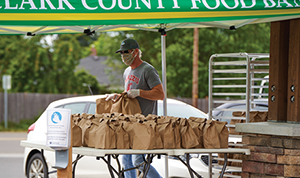 During the COVID-19 crisis of 2020, The Convenience Group hosted a drive-thru pop-up food giveaway for the Vancouver, Washington, community.
During the COVID-19 crisis of 2020, The Convenience Group hosted a drive-thru pop-up food giveaway for the Vancouver, Washington, community.
Meanwhile, the new Minit Mart store stocks a number of grocery items—including fresh fruit and vegetables—that neighborhood residents would otherwise have a hard time finding nearby. It’s paid off. The location has enjoyed a threefold sales growth since all of the additions and changes have been made, he says.
Store employees are even encouraged to keep their eyes open for customers in need of assistance. Some customers, for example, might be encouraged to check out the food bank next door or even offered assistance in finding a job.
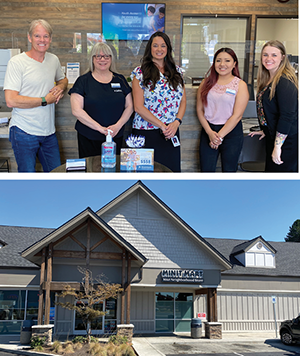 The Rivermark Community Credit Union team serves hundreds of lower-income Fruit Valley community members (top). It’s part of the Fruit Valley Village, anchored by Minit Mart (bottom).
The Rivermark Community Credit Union team serves hundreds of lower-income Fruit Valley community members (top). It’s part of the Fruit Valley Village, anchored by Minit Mart (bottom).
“We all have been through that place in our lives where having a helping hand is a very big deal,” Rhoads said. “You never know what mental or physical problems a customer might be going through. If someone is in need of assistance, we are well positioned to help, and it’s our obligation to do so.”
This brings us back to those sandlot football games in Kelso—and all the kids from the middle school who got a small assist from the Rhoads household.
The way Rhoads figures it, the question for him, his c-store chain and the c-store industry is never whether or not to reach out to help the other guy who is struggling—it’s how.